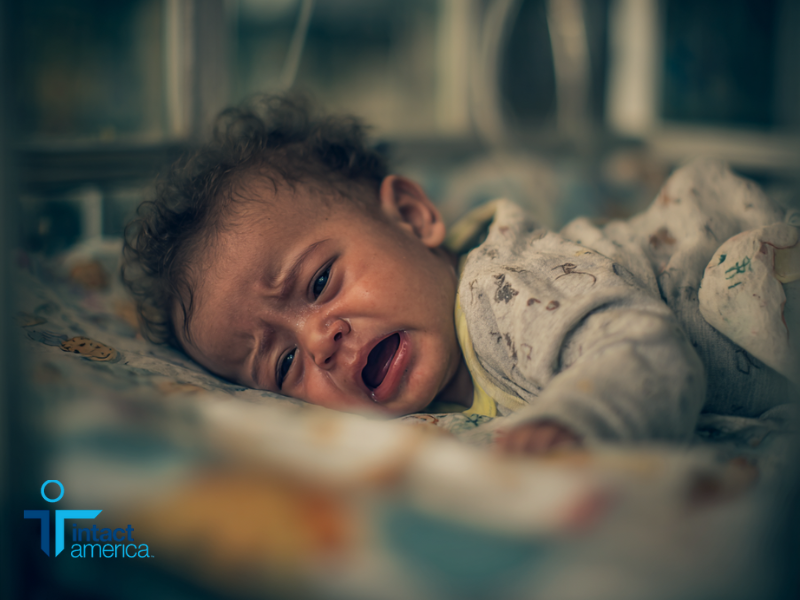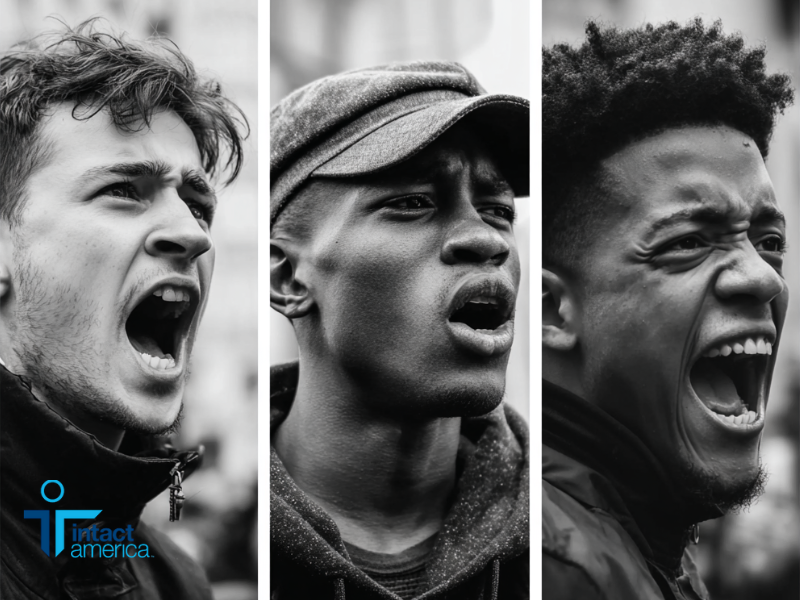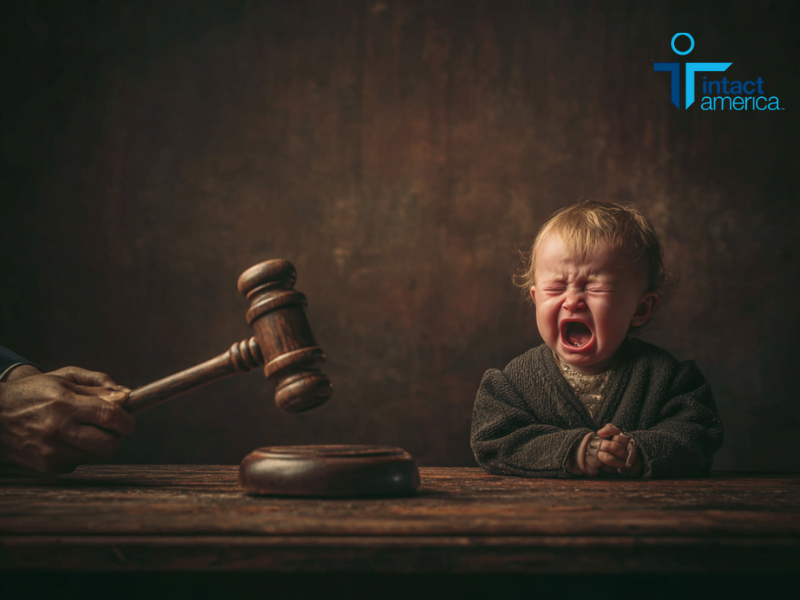 I am 77 years old. It has taken me a lifetime to deal with the consequences of the trauma of my circumcision as a newborn infant in 1942. For most of my life, the earliest memory I had of my mother was when we were traveling on a railroad train across the western plains from Louisville, Kentucky to the coast of Oregon to visit my father who was serving in the Coast Guard during WWII. I was two years old. As the train sped over the prairie, we needed to move from one car to another. The shaky and narrow walkways between the cars were open, windy and scary. My mother wanted to carry me, but I fought against her and insisted on walking on my own. I felt I had to do it myself because I could not trust my mother. This feeling hindered a close relationship between us for most of our lives. I was afraid of her. Fortunately, I had great attention and care from close relatives who were always available to and engaged with me for the first three years of my life while my father was absent, and my mother and I lived with her parents and older sister. I am forever grateful for their attention to me.
I am 77 years old. It has taken me a lifetime to deal with the consequences of the trauma of my circumcision as a newborn infant in 1942. For most of my life, the earliest memory I had of my mother was when we were traveling on a railroad train across the western plains from Louisville, Kentucky to the coast of Oregon to visit my father who was serving in the Coast Guard during WWII. I was two years old. As the train sped over the prairie, we needed to move from one car to another. The shaky and narrow walkways between the cars were open, windy and scary. My mother wanted to carry me, but I fought against her and insisted on walking on my own. I felt I had to do it myself because I could not trust my mother. This feeling hindered a close relationship between us for most of our lives. I was afraid of her. Fortunately, I had great attention and care from close relatives who were always available to and engaged with me for the first three years of my life while my father was absent, and my mother and I lived with her parents and older sister. I am forever grateful for their attention to me.
My first career was as an officer in the Coast Guard. However, in 1985 I turned down a significant promotion and many appeals and inducements by senior officers to remain in the Service. I had begun to pursue my interests in depth psychology and experiential approaches to self-individuation. I had become increasingly concerned about the Coast Guard and the competence and authoritarian style of its leadership, and I no longer wanted to be a part of it.
I decided to pursue a second career in clinical psychology. I recognized that I was suffering from PTSD and moral wounding, and that I was unable to trust or take in the satisfactions and further opportunities offered to me as the result of my accomplishments. I sought to avoid further injury and to obtain personal healing for myself. During my career change, I obtained effective, ongoing personal therapy that enabled me to communicate and heal my relationship with my mother. I was very glad to be able to express to her my love, understanding and appreciation of her while she was still alive.
As I explored academic programs in clinical psychology and counseling, I decided to take a self-indulgent year off and enroll in a new massage therapy school in Connecticut that was integrating aspects of experiential and body-centered psychotherapy. During this time, while receiving massage and while deeply relaxed and mindfully observing, I had body memories of my infancy. I felt hunger and the impulse to nurse along with the beginning of a penile erection. This rapidly turned into intolerable pain in my genitals. I realized I must have had some experience as a nursing infant that had required me to turn off feeling in order take in nourishment and survive, and that resulted in my associating the pleasure-seeking fulfillment of my needs with unbearable pain. I had developed an ability to strive, to accept and tolerate dangerous and painful circumstances. I became increasingly curious about my vivid body memory and its possible effects on all aspects of my life. I wondered if my mother, while holding and nursing me, had perhaps checked my diaper and accidentally stuck me in the genitals with a diaper pin.
When I was 43 years old, I asked my mother if she could recall any accident or difficulty when she was nursing me in infancy. I was shocked by her immediate explosion of emotion and the specific details. She named and swore at the obstetrician, telling me how he had nearly cut off the end of my penis and then sewn it back on with five stitches. She exclaimed how the doctor had insisted that newborns did not feel pain, that the circumcision process did not hurt and could not be the cause of my distress in her frantic attempts to feed me. She told me how the doctor said that her difficulties in comforting and nursing me were due to her breasts being too small and her milk inadequate, She told me how agitated and terrified she was in her attempts to care for me. Her powerful feelings of inadequacy, regret, helplessness, guilt and rage were evident as she told me things she had never before spoken about.
My mother’s account clarified and furthered my understanding of my early injury and its consequences. It increased my confidence in trusting in the power, depth and consequences of “body” memory” existing before “conscious” memory and the subsequent physical and psychological consequences.
I decided to train and became a body-centered psychotherapist, and had a second career in private practice with self-paying clients for over two decades until I became severely physically disabled due to compression fractures in my thoracic spine and, resulting spinal cord injuries resulting from a rare cancer throughout my spine, liver, and lungs. The cancer was caused by exposure to Agent Orange while I was skippering patrol boats in Vietnam in 1967-68.
My mother’s revelations to me about my circumcision confirmed my body memory and explained the basis of a vast number other beliefs and behaviors resulting from the experience. This understanding helped not only in my personal healing journey, but also in working successfully with clients suffering from severe physical and psychological issues that not had not been successfully treated with conventional medical treatments or talk therapies.
The answers to basic questions such as “Am I lovable?” “Can I trust others?”. “Can I get my needs met?” and “Is this world safe for me?” are fundamental in the development of individuals and cultures. The increasing incidence of adverse childhood experiences (ACE) resulting from our rapidly changing culture and the deep feelings of betrayal arising from the actions of authorities upon whom we rely are critical issues we face as individuals and as a nation.
The trust in the power and depth of the body memory of each individual and the use of body-centered psychotherapy and many wholistic practices have been of life-saving value to me, as well as to many of my clients. I am grateful that the complexities and difficulties in the paths of possibilities in my life journey are ongoing. I attempt to share what I believe might be beneficial to others.
Many find the topic of “circumcision” too painful to discuss, or even consider. I believe that the present conflicts between systems of human authority, privilege and control (including religion, politics, economics, science, and communication systems) are causing great harm, carried out by individuals attempting unsuccessfully to overcome their own deep personal insecurity and developmental traumas.
I am grateful for the critical work that Intact America is doing to recognize and end the trauma of genital mutilation of infant males.
— David Arnold
Interested in lending your voice? Send us an email, giving us a brief summary of what you would like to write about, and we will get back to you.




